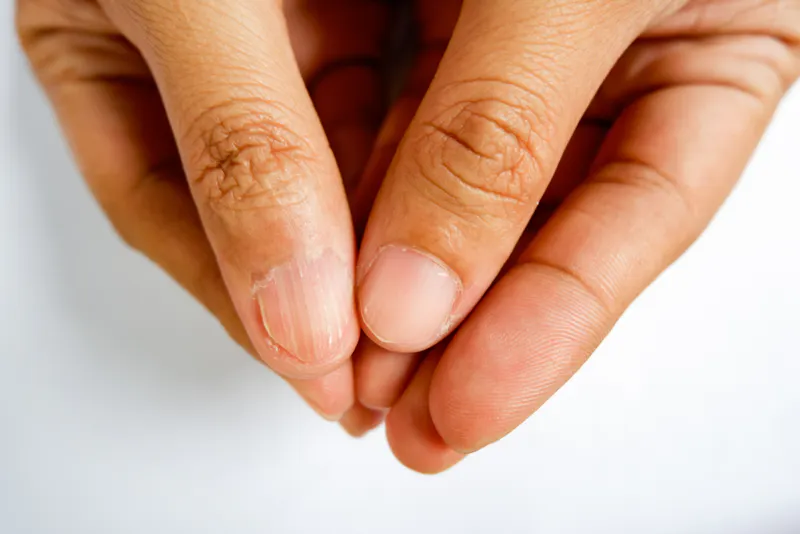What is iron deficiency anaemia?
What's covered?



Iron is a nutrient that’s needed to help transport oxygen around your body. If you don’t get enough it can lead to iron deficiency anaemia. Common symptoms of low iron levels include tiredness, shortness of breath, head pain, and heart palpitations. You can check to see if you’re getting enough iron with a blood test. Eating iron-rich foods or taking an iron supplement can help increase your levels.
What is iron?
Iron is a mineral (a type of micronutrient) that you get from your diet.
What does iron do?
Iron is an important part of haemoglobin — a protein in red blood cells. Haemoglobin helps carry oxygen from your lungs to the rest of your body.
What happens if you don’t get enough iron?
A lack of iron in your blood causes your haemoglobin levels to drop. This means your body can’t get enough oxygen. This can cause symptoms like fatigue, shortness of breath, anxiety and head pain.
Long-term, low iron levels can lead to iron deficiency anaemia.
What is iron-deficiency anaemia?
Anaemia is when your red blood cells don’t have enough haemoglobin. Anaemia can be caused by a range of things, but a lack of iron is the most common cause — this is called iron deficiency anaemia.
A lot of people don’t realise they have iron deficiency anaemia. So it’s important to know the symptoms.
Symptoms of iron deficiency anaemia
Common signs and symptoms of iron deficiency anaemia include:
- extreme tiredness
- weakness
- pale skin
- shortness of breath
- a fast or irregular heartbeat
- dizziness
Less common symptoms include:
- a tingling or crawling feeling in your legs
- a sore or swollen tongue
- cold hands and feet
- brittle nails
- headaches
- strange cravings to eat items that aren’t food — like dirt, ice, or clay
The symptoms of iron deficiency anaemia can be subtle and easily missed. If you have any of these symptoms it’s really important to check your iron levels.
Causes of iron deficiency anaemia
Your iron levels can drop if:
- your diet is low in iron — vegans and vegetarians are sometimes low in iron
- you suffer from a gastrointestinal disorder — like coeliac disease or Crohn’s disease
- you have heavy periods
- you lose lots of blood during childbirth
It’s not as common, but internal bleeding can lead to low iron levels — for example, if you have an ulcer or cancer.
How to test your iron levels
There are several blood tests to check your iron levels:
- haemoglobin
- ferritin — a protein that stores iron and releases it when your body needs it
- transferrin saturation — the amount of iron bound to transferrin ( a protein that transports iron)
- total iron-binding capacity (TIBC) — the amount of transferrin in your blood that's available to attach to iron
- unsaturated iron-binding capacity (UIBC) — the amount of iron-binding sites on transferrin (transports iron around your body) that aren't bound to iron
Iron ranges
The ideal ranges for each test are:
- haemoglobin — 120-160 g/L for women and 130-170 g/L for men
- serum ferritin — 13-150 ng/l for women and 30-400 ng/l for men
- transferrin saturation — 20-55% for both women and men (the % of transferrin in your blood that’s free to carry iron)
- TIBC — 45-72 umol/L for both women and men
- UIBC — 24.2-70.1 umol/L for women and 22.3-61.7 umol/L for men
How to increase your iron levels
Try to make sure you’re getting enough iron from your diet. Good sources of iron include:
- pulses — like lentils, beans, and peas
- pumpkin and squash seeds
- dark green leafy vegetables — like kale, spinach, and watercress
- dried fruit — like raisins
- red meat
- seafood — like mussels, clams or oysters
- iron-fortified cereals
Combining plant-based sources of iron with vitamin C can help increase how much you absorb. Most fruits and vegetables are good sources of vitamin C. Also, try to avoid too much tea, coffee, and milk, as this can stop you from absorbing iron.
If you can't get enough from your diet, an iron supplement might help. It's a good idea to get advice from a health professional before taking a supplement.
National Institue of Health (2018). Office of dietary supplements. Iron: Fact sheet for health professionals. Retrieved 21 May 2019 from https://ods.od.nih.gov/factsheets/Iron-HealthProfessional/.
National Health Services (2017). Overview: Vitamins and minerals. Retrieved 21 May 2019 from https://www.nhs.uk/conditions/vitamins-and-minerals/.
NHS (2018). Iron deficiency anaemia. Retrieved 21 May 2019 from
https://www.nhs.uk/conditions/iron-deficiency-anaemia/.
Labs test online (2018). Anaemia. Retrieved 21 May 2019 from https://labtestsonline.org.uk/conditions/anaemia.